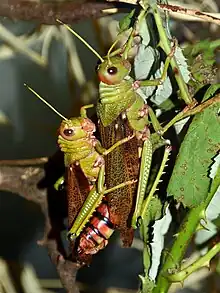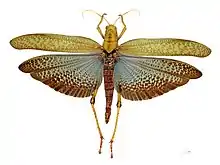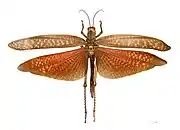Tropidacris
Tropidacris is a Neotropical genus of grasshopper in the family Romaleidae.[3][4][5] They are among the largest grasshoppers in the world by length and wingspan, reaching up to 14.5 cm (5.7 in) and 24 cm (9.4 in) respectively.[6][7] They are variably colored in green, brown, black, reddish or yellowish, and have wings that usually are conspicuously blue (T. collaris and T. descampsi) or red (T. cristatus) in flight.[5][8] The gregarious and flightless nymphs have bright aposematic colors and are presumed to be toxic;[7][9] a researcher who tasted one noted that it was very bitter, similar to a monarch butterfly.[10]
| Tropidacris | |
|---|---|
 | |
| Tropidacris collaris, mating pair | |
| Scientific classification | |
| Domain: | Eukaryota |
| Kingdom: | Animalia |
| Phylum: | Arthropoda |
| Class: | Insecta |
| Order: | Orthoptera |
| Suborder: | Caelifera |
| Family: | Romaleidae |
| Subfamily: | Romaleinae |
| Tribe: | Tropidacrini |
| Genus: | Tropidacris Scudder, 1869 [1] |
| Synonyms | |
| |
These locally abundant grasshoppers inhabit a wide range of habitats, from rainforests to dry open areas and lowlands to highlands.[8][11] Both adults and nymphs feed on many types of plants and decaying matter, and (especially A. collaris) are sometimes regarded as pests because of the considerable damage they may cause to agricultural crops, tree plantations and ornamental plants.[8][11]
Taxonomy
Tropidacris and the closely related Titanacris form the tribe Tropidacrini, but the latter genus, which generally is restricted to forest canopies of South and Central America, is not as well known.[12] Unlike Tropidacris, adult Titanacris are always mostly green (only some Tropidacris are mostly green) and have colorful wings that lack dark rear edge and spotting.[12]
There are three recognized species in the genus Tropidacris:[3]
- Tropidacris collaris (Stoll, 1813) – blue-winged grasshopper or violet-winged grasshopper
- Tropidacris cristata (Linnaeus, 1758) – giant red-winged grasshopper
- Tropidacris descampsi Carbonell, 1986
Several additional species have been described, but these are now regarded as synonyms of the widespread and well-known T. collaris or T. cristata.[5] T. descampsi is poorly known with only a few confirmed specimens from the Colombian Amazon and western Brazilian Amazon.[5][8]
References
-
- Scudder, 1869 : Notes on Orthoptera collected by Professor James Orton on either side of the Andes of Equatorial South America. Proceedings of the Boston Society of Natural History, vol. 12, p. 330-356
- Hebard. 1923. Trans. Amer. Entomol. Soc. 49:252
- Orthoptera Species File
- Catalogue of life
- Carbonell, C.S. (1986). "Revision of the Neotropical Genus Tropidacris (Orthoptera, Acridoidea, Romaleidae, Romaleinae)". Proceedings of the Academy of Natural Sciences of Philadelphia. 138 (2): 366–402.
- Dinez-Filho, J.A.F.; et al. (2010). "Ensemble forecasting shifts in climatically suitable areas for Tropidacris cristata (Orthoptera: Acridoidea: Romaleidae)". Insect Conservation and Diversity. 3 (3): 213–221. doi:10.1111/j.1752-4598.2010.00090.x.
- Whitman, D.; Vincent, S. (2008). "Large size as an antipredator defense in an insect". Journal of Orthoptera Research. 17 (2): 353–371. doi:10.1665/1082-6467-17.2.353.
- Paula Romão, E.d. (2017), Distribuição geográfica e potencial das espécies do gênero Tropidacris Scudder, 1869 (Orthoptera: Romaleidae), Pará State University
- Despland, E.; Srygley, R.B. (2020). "Ontogenetic shift from aposematism and gregariousness to crypsis in a Romaleid grasshopper". PLoS One. 15 (8): e0237594. doi:10.1371/journal.pone.0237594. PMC 7444530.
- Starr, C.K. (1998). "Field observations of Tropidacris collaris (Orthoptera: Romaleidae)". Living World. 1997–1998: 46–47.
- França Rocha, M.d.; et al. (2015). "Spreading of heterochromatin and karyotype differentiation in two Tropidacris Scudder, 1869 species (Orthoptera, Romaleidae)". Comp Cytogenet. 9 (3): 435–450. doi:10.3897/CompCytogen.v9i3.5160. PMC 4547036.
- Descamps, M.; Carbonell, C.S. (1985). "Revision of the Neotropical Arboreal Genus Titanacris (Orthoptera, Acridoidea, Romaleidae)". Annales de la Société entomologique de France. 21 (3): 259–285. doi:10.1080/21686351.1985.12278760.

